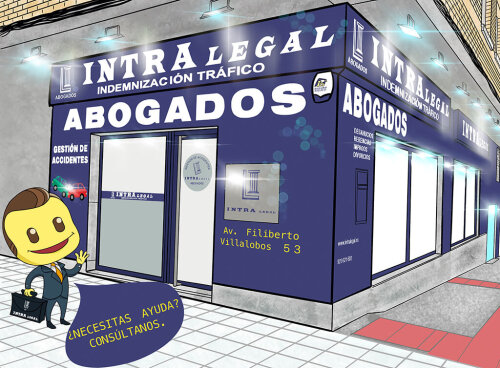Best Toxic Mold Lawyers in Salamanca
Share your needs with us, get contacted by law firms.
Free. Takes 2 min.
List of the best lawyers in Salamanca, Spain
About Toxic Mold Law in Salamanca, Spain
Toxic mold, or “moho tóxico,” is a type of fungus that can pose serious health risks and property damage in homes, schools, workplaces, and rental properties throughout Salamanca, Spain. Exposure to toxic mold can cause respiratory problems, allergic reactions, skin irritation, and may worsen pre-existing health conditions. Legal matters related to toxic mold typically focus on issues of property maintenance, landlord-tenant responsibilities, health and safety standards, and liability for harm or damages resulting from mold exposure.
Why You May Need a Lawyer
There are several situations in which hiring a lawyer knowledgeable in toxic mold cases can be essential:
- If you are a tenant dealing with persistent mold in your rental and your landlord is not taking appropriate action to remedy the problem.
- When a property owner is facing claims from tenants or buyers regarding mold-related health issues or property defects.
- If you have suffered personal injury or incurred medical expenses because of toxic mold exposure and need assistance in pursuing compensation.
- When insurance companies deny or limit coverage for mold damage.
- In disputes between property buyers and sellers when mold contamination was not disclosed properly.
- If you need guidance interpreting local regulations or public health codes related to toxic mold in Salamanca.
Local Laws Overview
In Salamanca, toxic mold issues are primarily governed by a combination of Spanish national laws and local municipal regulations. The Spanish Civil Code (Código Civil) sets forth general obligations for property maintenance and habitability. Specific health regulations managed by the Ministry of Health (Ministerio de Sanidad) and local councils establish minimum standards of hygiene and building safety.
Landlords have a legal obligation to ensure that properties are habitable, which includes keeping them free of dangerous mold growth. Tenants have the right to demand repairs and may seek legal remedies if their health is compromised or if the property becomes uninhabitable. In some cases, repeated complaints about mold may result in municipal health inspectors ordering remediation or, as a last resort, closing a property until it complies with safety standards.
Homeowners, landlords, and sellers are also required to inform buyers or tenants about any known defects, including mold issues, to avoid future liability claims. Failure to disclose such information can result in civil claims or administrative penalties.
Frequently Asked Questions
What is considered toxic mold and how can I identify it?
Toxic mold generally refers to mold species like Stachybotrys chartarum (black mold) and others that produce mycotoxins, which can be harmful to health. Identifying toxic mold often requires professional inspection and laboratory testing.
What responsibilities do landlords have regarding mold in Salamanca?
Landlords are legally required to maintain rental properties in a habitable condition. This includes addressing and remediating mold issues that could compromise the safety or well-being of tenants.
Can I withhold rent if my landlord does not remove toxic mold?
Spanish law allows tenants to request urgent repairs and, in some situations, may authorize withholding rent if the property is deemed uninhabitable. However, it is important to follow the proper legal process and consult a lawyer before taking such action.
What should I do if I suspect toxic mold in my home or rental property?
You should notify the property owner or landlord in writing and request an inspection. If they do not respond, you can contact your local health authority or seek legal advice for further steps.
Can tenants sue landlords for health problems caused by toxic mold?
Yes, tenants have the right to pursue legal action if they can demonstrate that the landlord’s negligence regarding mold caused personal injury or health issues.
Is there a time limit to make a claim about toxic mold?
Limitation periods can vary depending on the type of claim, but prompt action is recommended. In cases of personal injury or consumer disputes, deadlines usually range from one to five years.
Are mold inspections required before selling a property?
While not always legally required, sellers must disclose any known defects, including mold problems. Failure to do so can result in later claims or annulment of the sale.
Who is responsible for mold in a shared building (community of owners)?
Responsibility typically depends on whether the mold originates from shared areas or individual units. The community of owners may be liable for shared areas, while individual owners are accountable for mold within their own property.
Will homeowners or renters insurance in Spain cover mold damage?
Coverage depends on the terms of the policy. Some insurance policies exclude mold, while others may cover mold damage resulting from specific incidents like water leaks. Review your policy or consult a lawyer for advice.
How can I prove that mold exposure caused my illness?
Medical documentation, expert assessments, and environmental testing reports are commonly used to establish a link between mold exposure and health problems in legal cases.
Additional Resources
If you are seeking more information or assistance regarding toxic mold in Salamanca, the following resources may be helpful:
- Ayuntamiento de Salamanca (Salamanca City Council) - Environmental Health Department.
- Junta de Castilla y León - Regional Health and Housing Departments.
- Ministerio de Sanidad (Ministry of Health) - Health regulations and guidelines on property health.
- Confederación de Consumidores y Usuarios (Consumers and Users Organization) - Advice for tenants and homeowners.
- Colegio de Administradores de Fincas (Association of Property Administrators) - Guidance on building management and maintenance.
Next Steps
If you suspect toxic mold in your living or working environment in Salamanca, the first step is to document the problem with photos and written descriptions. Notify the responsible party (landlord, property manager, or seller) in writing and request remedial action. If your complaint is not addressed, you can seek assistance from local health authorities or consider consulting an experienced lawyer who handles toxic mold cases. A legal professional can help assess your situation, explain your rights, and guide you through the claims process, whether it involves negotiation, mediation, or court proceedings.
Acting promptly is essential to protect your health and legal rights. Consider gathering all relevant documents, correspondence, medical reports, and inspection results to support your case. A qualified lawyer in Salamanca can provide personalized advice and help you secure a fair resolution.
Lawzana helps you find the best lawyers and law firms in Salamanca through a curated and pre-screened list of qualified legal professionals. Our platform offers rankings and detailed profiles of attorneys and law firms, allowing you to compare based on practice areas, including Toxic Mold, experience, and client feedback.
Each profile includes a description of the firm's areas of practice, client reviews, team members and partners, year of establishment, spoken languages, office locations, contact information, social media presence, and any published articles or resources. Most firms on our platform speak English and are experienced in both local and international legal matters.
Get a quote from top-rated law firms in Salamanca, Spain — quickly, securely, and without unnecessary hassle.
Disclaimer:
The information provided on this page is for general informational purposes only and does not constitute legal advice. While we strive to ensure the accuracy and relevance of the content, legal information may change over time, and interpretations of the law can vary. You should always consult with a qualified legal professional for advice specific to your situation.
We disclaim all liability for actions taken or not taken based on the content of this page. If you believe any information is incorrect or outdated, please contact us, and we will review and update it where appropriate.











